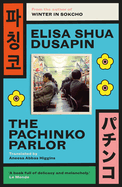
Winter in Sokcho, the extraordinary first novel, gorgeously translated by Aneesa Abbas Higgins, by French Korean author Elisa Shua Dusapin, won the 2021 National Book Award for Translated Literature. The two reunite for The Pachinko Parlor, in which Dusapin's remarkably intricate and lean prose reveals a layered narrative about isolation and displacement.
Claire, a graduate student from Switzerland, visits her maternal Korean grandparents in Tokyo and plans to travel with them back to Korea. Much is immediately lost in translation: Claire's native language is French, and because her grandparents speak Korean and Japanese, their communication relies on "simple English, with a few basic words in Korean." Her grandparents left Korea in 1952, escaping the civil war after surviving the brutal Japanese occupation--a time when speaking Korean was punishable by death. They opened the Shiny, a pachinko parlor, more than half a century ago; her 90-year-old grandfather still works daily while her grandmother stays home, progressively disconnecting from the world. Claire tutors a local child, 10-year-old Mieko, in French while her mother, a French literature professor, works; mother and daughter are the only residents of an abandoned hotel they won't leave in case Mieko's vanished father miraculously returns. Time jumps forward, but any future clarity--perhaps an ironic nod to Claire's very name--remains elusive.
Dusapin sets her novel amid a Tokyo heat wave, brilliantly imbuing the story with a sense of stifling unease. Claire can't connect with her grandparents; her peripatetic parents aren't available; she's estranged from her lover; and any attachment with Mieko is fleeting. Dusapin's spotlight on characters who ache with longing is a dazzling consideration of loneliness. --Terry Hong, Smithsonian BookDragon

